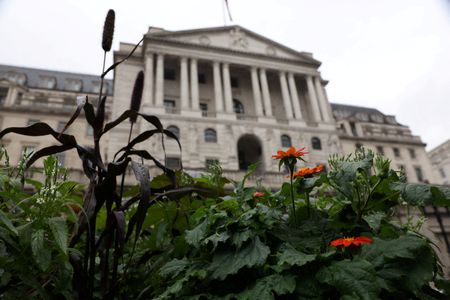 1
1 1
1
By David Milliken, Andy Bruce and Suban Abdulla
LONDON (Reuters) – The Bank of England raised its key interest rate by a quarter of a percentage point to a 15-year peak of 5.25% on Thursday, its 14th back-to-back increase, and warned that borrowing costs were likely to stay high for some time.
While the U.S. Federal Reserve and the European Central Bank signalled that their rate hikes were nearing an end when they both raised borrowing costs by a quarter-point last week, the BoE’s Monetary Policy Committee (MPC) gave no such suggestion it was about to pause as it continues to battle high inflation.
“The MPC will ensure that Bank Rate is sufficiently restrictive for sufficiently long to return inflation to the 2% target,” the BoE said in fresh guidance.
Governor Andrew Bailey stressed that message, even as the BoE saw the economy growing only minimally in the coming years.
“I don’t think it is time to declare it’s all over,” he told a press conference, adding it was “far too soon” to speculate about the timing of any rate cuts. Bailey also said “we might need to raise interest rates again but that’s not certain”.
British inflation hit a 41-year high of 11.1% last October and has fallen more slowly than elsewhere, standing at 7.9% in June, the highest of any major economy.
Deputy Governor Ben Broadbent said keeping relatively high rates over an extended period was key for cutting inflation.
Despite the BoE’s message, financial markets – which had seen a more than one in three chance of a half-point rate rise to 5.5% – focused on how the BoE had for the first time described its policy stance as “restrictive”.
Investors moved to price in slightly less BoE tightening, with rates seen peaking at 5.75% and two-year bond yields down, although investors still saw a two-in-three chance that rates would rise to 5.5% next month. Sterling was little changed on the day.
Analysts at NatWest cut their forecast for peak Bank Rate to 5.5% from a previous estimate of 6%.
“The Bank of England today acknowledged for the first time in the current tightening cycle that its monetary policy is tight,” Kallum Pickering, senior economist at Berenberg, said.
“Although policymakers kept open the prospect of further hikes … this supports our call that the BoE is close to peak rates.”
The BoE has been criticised for sounding too relaxed about inflation in the past. Now the BoE is alarmed that inflation’s rise is becoming a long-term problem for the economy.
Bailey said the pace of pay growth was “materially above” the BoE’s previous forecasts.
Wage rises had been a bigger driver of high inflation than companies’ profit margins, the BoE said.
THREE-WAY SPLIT
Policymakers voted 6-3 for the increase, but were split three ways on the decision for the first time this year. Two MPC members – Catherine Mann and Jonathan Haskel – voted for a bigger, half-point increase, while Swati Dhingra again voted for no change, warning of the risk of smothering the economy.
New MPC member Megan Greene voted in line with the majority after she replaced Silvana Tenreyro, one of the MPC’s doves.
The BoE forecast inflation would fall to 4.9% by the end of this year – a faster decline than it had predicted in May.
This will be a relief for Prime Minister Rishi Sunak, who pledged in January to halve inflation this year, a goal which had looked challenging.
“If we stick to the plan, the Bank forecasts inflation will be below 3% in a year’s time without the economy falling into a recession,” finance minister Jeremy Hunt said after the BoE’s announcement.
Not everyone backs the BoE’s approach. A small number of protesters from campaign group Positive Money gathered outside the central bank on Thursday.
“What we need are better tools for dealing with inflation than blunt instruments like interest rates, and a windfall tax on bank profits to redress the harm done to workers and families by rate hikes,” Positive Money campaigner Hannah Dewhirst said.
Mortgage costs have hit their highest since 2008, weighing on house-building. The BoE forecast housing investment would fall 5.75% this year and 6.25% in 2024.
The jobless rate is predicted to rise by more than before, reaching 4.8% in late 2025 from 4.0% now.
Overall, the BoE noted the economy’s recent “surprising resilience” but barely changed its growth forecasts from three months ago, with the economy due to expand a meagre 0.5% in 2023 and 2024, and just 0.25% in 2025.
Inflation is not expected to return to its 2% target until the second quarter of 2025, three months later than May’s forecast. Services price inflation – which the BoE said offered a longer-term price signal – was projected to stay high.
Wage growth at the end of this year was expected to be 6%, up from May’s forecast of 5%, as pay demands had not fallen in line with lower prospects for inflation.
“Some of the risks of more persistent inflationary pressures may have begun to crystallise,” the BoE said.
(Reporting by David Milliken, Andy Bruce and Suban Abdulla; Editing by William Schomberg, Catherine Evans and Giles Elgood)